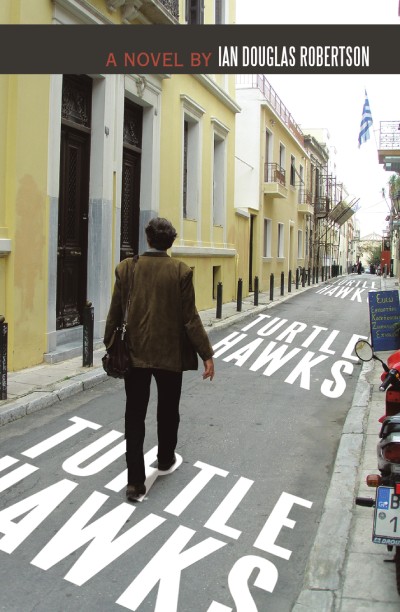
Turtle Hawks, a contemporary, literary/commercial novel, focuses on a week in the life of Peri (Pericles) Pontakis, 56, a Greek TV celebrity, who is forced by circumstances to confront personal failure, both in his private and professional life. Peri is on a mission to root out corruption in Greek society. However, he is beginning to realize that he has been walking a thin line between commitment to his political ideals and those he loves, fulfilling neither, as well as many other ‘thin lines’ between the individual and society, between a contempt for money and financial need, between public adoration and personal isolation, etc.
Having worked for Channel 5 for more than five years, he is sacked for pillorying a prominent doctor against the wishes of the ‘boss’. He begins to doubt himself and his efficacy as a journalist. He is also lonely, despite the number of fans who greet him in the street. He lives alone in what his son has described as a ‘soulless’ flat, with an unemployed and not altogether trustworthy colleague/tenant as his only friend. His only real comfort is Jack, his cat, and the Acropolis, eloquently visible from his bedroom window.
He has many female admirers, including his PA and the boss’s daughter. They are both insecure, both attractive and both problematic, the former ‘unhappily’ married, but profoundly attached to her young daughter, the latter a depressive with a history of drug and alcohol abuse. Against his better judgment, Peri allows himself to be seduced by one of them.
He has been commissioned to make a documentary about the Caretta Caretta turtle. This entails a trip to one of the Ionian Islands with his crew. He believes that this ‘undemanding’ project will provide him with an opportunity to re-think his life.
Like the other main characters, his personal assistant, Ilya, and his chief editor, Makis, he is at a crossroads. And, he knows, better than most, that when it comes to important decisions, more often than not, he makes the wrong one.
Why Turtle Hawks? I set out to write what I hoped would be a ‘readable’, fast-paced and suspenseful novel, populated by well-rounded characters. In the first decade of the second millennium, when I wrote this novel, I greatly admired a Greek TV presenter, who was outspoken and defiant. He wasn’t afraid to stand up against the powerful, especially those who considered themselves above the law. So, I chose him as my protagonist.
I liked the idea of the media as a setting because I was aware of how powerful it can be. Not only is it capable of alerting the justice system to criminal activities but it also possesses the clout to install or topple governments, exerting great influence on its audiences and readership. I wanted to enter this world and explore not only the power but also the fickleness of the media and celebrity status, highlight its shallowness and inordinate power, controlled in many cases by newspaper or TV magnates affiliated to a political party, with the result that news coverage is often biased and manipulative.
At the time of writing there was a great deal of discussion in the media in Greece about the misconduct of doctors who were rapaciously exploiting their patients’ vulnerability, taking backhanders or ‘fakellakia’ (little envelopes), as they are called, in order to bestow preferential treatment or enable them to ‘jump the queue’. Peri wished to bring this to light. In doing so, he provokes his boss’s ire, which leads to his dismissal from the TV channel where he works.
I wanted Peri to be a complex, multi-faceted individual, who was somewhat unpredictable, and, in many ways, his own worst enemy. I envisaged him as ruggedly handsome, attractive to women, but I didn’t want him to be a philanderer. As is the case with many public figures, his personal life is a mess, having neglected his family and himself in pursuit of an ideal, which he is beginning to realize is unattainable. He is at a point where he is disillusioned with life and frustrated with his job, aware of his own impotence and inability to effect significant change.
However, he is conscious of the fact that there are others who are a great deal worse off, in particular his ex-colleague Christos. Christos is practically unemployed and in arrears with the rent. Though Peri has little sympathy for him, as he believes he has allowed himself to lapse into self-pity and inertia, he doesn’t have the heart to evict him or desert him as a friend. Finding himself unemployed like Christos, Peri is aware that there is a very thin line differentiating him from his old buddy.
Turtle Hawks is set in Athens but the basic elements of the story are universal; alienation, reconciliation, conflict, love, jealousy, greed, etc. The novel does give some insight into Greek society but it is a story that could take place anywhere in the world. I originally entitled it The Thin Line, as Peri finds himself walking a number of thin lines. Finally, I called it Turtle Hawks, playing on the words Turtle Doves. Peri undertakes an investigation into the Caretta Caretta turtle and the corruption that is rampant in the municipality of the Ionian Island where the turtle comes to nest each year. So, as the novel has more hawks than doves, I thought Turtle Hawks was more appropriate.